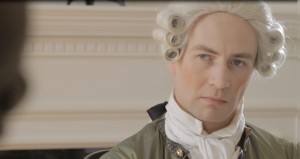The Inevitable Surprise
 We’re at the “plot points” stage of episode #4, where we debate what happens to whom, how we match it to the events of the era, and what we have the means to attempt. For example, in this next episode, we’re very confident that Reverend Laud, in a flash back scene, needs to give a pretty spirited Whig (read patriot) sermon. Else why would Silas ever hire him for the Courage pulpit? But, wait, why would Laud be giving a liberty sermon when he can’t wait to be ordained into the King’s established church? What’s the deal here?
We’re at the “plot points” stage of episode #4, where we debate what happens to whom, how we match it to the events of the era, and what we have the means to attempt. For example, in this next episode, we’re very confident that Reverend Laud, in a flash back scene, needs to give a pretty spirited Whig (read patriot) sermon. Else why would Silas ever hire him for the Courage pulpit? But, wait, why would Laud be giving a liberty sermon when he can’t wait to be ordained into the King’s established church? What’s the deal here?
Well, we have an explanation for all of that, and I think it’s a reasonably good one, but what I want to wrestle with today is the intersection of action and character and surprise. In writing, the best things always happen by surprise. When you chart out the entire action of a story, before hand, you limit the range of your surprise, and you can turn a story into a kind of predictable travel-log. This planning needs to be done or you end up with a stinking confection of the implausible and the unwieldy, but you have to chart the course in the way Columbus charted his course for the New World, with some fear that you just might fall off the end of the earth.
For example, we had an idea for Governor Wentworth playing chess with a henchman. I called him “Krepps,” but his name might change. For some reason, I saw Governor Wentworth, frustrated by a losing game, looking up and saying “Krepps, you are an ugly man.” The line just sort of appeared there as a way of commencing the conversation, and then I saw the thick-framed, battle-scarred enforcer saying, “true enough, governor.”
To me, this works because it achieves a kind of instant surprise. We expect frustration and a little rage when faced with loss, but, from a royal governor we might not expect so frontal and rude an assault. The henchman’s calm reconciliation to his own ugliness seems a bit surprising too. Don’t we expect an insult to inspire a defense? Surrender is almost always surprising. It also achieves a kind of surprise in the arena of what we assume about life and station and education. When we lose at chess, we expect to lose to someone more refined and well schooled. We don’t expect to lose to someone whose fingers are so thick they appear unable to pick up the pieces.
Allowing dialogue to surprise literally builds character as well. When you consider the Napoleon Dynamite character in the movie of the same name, the fellow is taken beyond mere nerd, what could have been his “stock” status, to a kind disarmingly funny “annoyed, cranky, blustering, quixotic nerd.” It’s no surprise now, because everyone knows these lines, but when he said “I’m just practicing some dance moves,” the surprise (nerds don’t dance), ends up defining him as a socially disconnected guy who dreams big things.
This is all terribly important when we’re re-living a set of stories about known outcomes — the struggles of the American Revolution. Yes, someday, the patriots of New Hampshire will roll a cannon up to the doorstep of Governor Wentworth and he’s going to be ushered, ingloriously, out of the colony, but along the way, what makes the struggle interesting, and more challenging, is the surprising humanity of those who were on the right and wrong side of the struggle. Villains sometimes show disturbing compassion and heroes alarming selfishness and pride.
The road may be known, but we have to see something along the way we didn’t see before.
